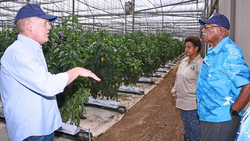
Innovative Agro Industry's executive director, Illan Weiss, gives Fiji's prime minister Sitiveni Rabuka a tour of the 9 Mile Vegetable Farm in Papua New Guinea in May. (Photo: Fiji's government)
The investor building PNG’s agriculture industry
by Danielle Myles
Agriculture is at the heart of Papua New Guinea’s (PNG) drive to diversify its FDI away from natural resources. The government wants to leverage the country’s fertile conditions to attract investors who can commercialise its farming tradition and reduce reliance on imports.
To date, the industry’s biggest FDI success story is Innovative Agro Industry. Since entering the Pacific island nation in 2011, the Israeli-owned firm has mobilised $200m-worth of foreign investment to build a network of 16 dairy, poultry, hydroponic and other farms scattered across the country.
Executive director Ilan Weiss spoke with fDi about its work with local farmers, the industry’s potential, and how to overcome on-the-ground challenges.
Q: What sparked the original decision to establish farms in PNG?
A: When we first came here in 2011, we immediately saw that the country was totally dependent on imports for every type of food you can think of. From rice to vegetables to dairy, everything was imported at very high prices. So our first project was the 9 Mile Vegetable Farm [near the capital Port Moresby] to locally produce vegetables at a lower cost. It now produces the majority of fresh vegetables sold in the capital.
Q: What other benefits have the farms brought the country?
A: They help with import replacement, which was our first objective, and they create jobs. The 9 Mile farm alone employs about 200 people. It also eases the country’s foreign exchange shortage, because there is rarely enough foreign currency to meet the country’s needs.
A lot of our other investments also help with capacity-building and training. We work with local farmers and have introduced new agricultural and production technologies into the country.
Q: The government wants to develop its downstream processing capacity. How are you helping to do that?
As part of our farm network, we operate industrial centres that only do downstream processing. They engage local farmers within a local catchment area that grow the produce. For example, we have a factory in the highlands that produces KUK Chips, the country’s first frozen french fries. We’ve created a market for the potato farmers that did not exist before, and we replace chips arriving all the way from Europe.
Q: What challenges do you face on the ground – including the country’s high crime rate – and how do you prepare for them?
One of the biggest hurdles is logistics: getting ourselves and goods from one place to another. So when we make our investments we look for lightweight, high-value products that can easily be preserved and transported.
Other hurdles are enabling infrastructure like utilities, and security to some extent. Usually we have good, amicable relations with the communities around us, but we have had incidents from time to time. My biggest worry is the women we employ, because they are susceptible to crime going to and from work, so we organise transport to protect them along the way.
Q: What is your message to other foreign investors considering PNG’s agriculture industry?
The promise is huge and the country has a lot to offer. It has ambient conditions, fertile soil, and water, which is becoming a scarce resource around the world. Papua New Guineans have been farming for thousands of years. They lack modern technology and training but they’re good farmers. More than 80% of [people] live off the land. Unlike in the developed world, where you don’t very often see the next generation of farmers, here it’s embedded in the culture. There are some challenges, but if you invest in agriculture for food produc











